
The2023 Maritime Guangdong Young Director Support Program (Maritime Guangdong Program)held the "Maritime Guangdong Film Festival × Mobile Lingnan" academic screening series at Jinan University on December 21st. This is the first time that the short films created by young directors of the Maritime Guangdong Program have appeared in domestic universities, and the works have won resonance and praise from teachers and students from the university.
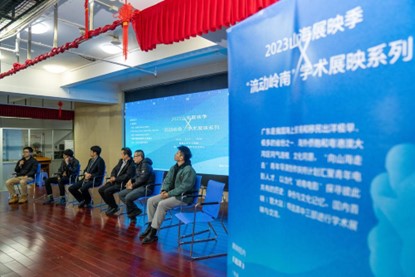
The academic screening series of "Maritime Guangdong Film Festival × Mobile Lingnan" is hosted by Yangcheng Evening News Group, and co-hosted by the College of Chinese Language and Culture, the College of Liberal Arts and the Collaborative Center for the Promotion of Chinese Culture in Hong Kong, Macau, Taiwan, and Overseas of Jinan University, and the Lingnan Digital Humanities Experimental Teaching Demonstration Center in Guangdong Province.
Maritime Guangdong Program short films resonate with teachers and students
Jinan University is the first overseas Chinese university established by the Chinese government. The Maritime Guangdong Program has selected three root-seeking-themed works for screening, resonating with many students and teachers at Jinan University.
In "My Brother", a film by young director Adam Yang from Shantou, he attempts to answer a question: What exactly is "root"? He admits, "The concept of 'root' for the younger generation may not be as important as the one for the older generation. It seems like everywhere can be their 'root'. But the older generation believes that the 'root' is where their parents are." Is "root" referring to a specific place or a specific person? Exploring the answer became the original intention behind Adam Yang's creation of "My Brother".
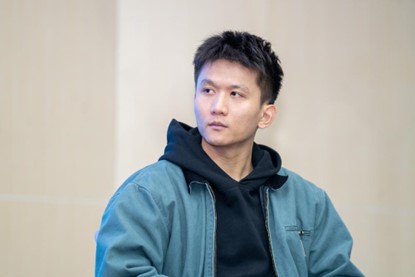
To shoot "The River That Holds My Hand", Chaozhou young director Chen Jianhang took the crew to Vietnam to find the footsteps of overseas Chinese who turned a foreign land into their hometown. He revealed, "Almost every Chaozhou person around me will have an overseas Chinese relative. I hope to use the camera to record the bits and pieces of their lives. This is not just a personal story, but also the memory of the times."
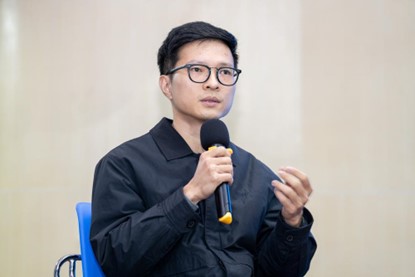
In "How Can I Rid My Mind of Her", Huang Wenli, a young director from Qingyuan, tells a story that takes place on an overseas Chinese farm. The protagonist in the film is a returned overseas Chinese who experiences a series of life's sorrows - first losing his homeland and then losing his loved one on the way back to his home country. Huang Wenli said, "What I want to express is that time is no panacea. Some sorrows will not disappear with time, and what we need to learn is how to coexist with them."

That night, the students of Jinan University expressed their understanding and love for the films after watching them. It is worth mentioning that two Jinan University alumni came to watch the film specially. Both of them are overseas Chinese, so they are particularly interested in films about overseas Chinese. They spoke highly of the three Maritime Guangdong Program short films. One of the alumni revealed, "I have been a reader of Yangcheng Evening News for many years. When I saw the news about the screening of the Maritime Guangdong Program in the newspaper, I immediately told my son that I must come and watch it no matter what." The other alumnus was even more excited after watching the films. She said, "When I returned to China from Indonesia many years ago, I was 18 years old and spent 20 years on overseas Chinese farms. Now I am 81 years old. Tonight's films have brought back memories of my youth." She expressed her hope to see more films about overseas Chinese in the future.
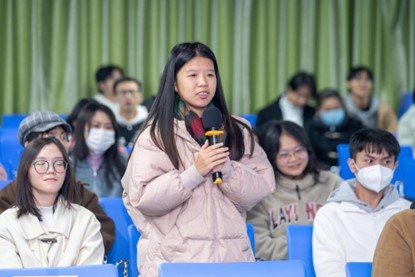
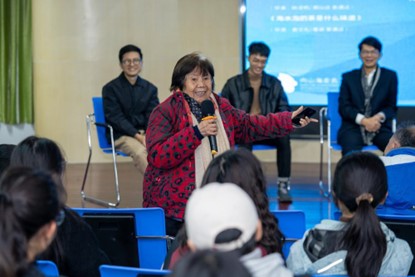
Scholars at Jinan University: Dialects help with local expression
That evening, Professor Hou Xingquan, Dean of the College of Chinese Language and Culture at Jinan University, Professor Liu Yonglian, Director of the Sino-Foreign Relation Institute at Jinan University's College of Liberal Arts, Associate Professor Zheng Huanzhao, a young literary critic from the Department of Chinese Language and Literature of Jinan University, and other experts and scholars, reviewed three Maritime Guangdong Program short films and had discussions with the young directors.
Zheng Huanzhao expressed his appreciation for the exquisite selection of topics in the three short films. He pointed out, "In the past, the stories of overseas Chinese often emphasized the lives of Chinese people abroad. However, these young directors, based on their own hometown, have chosen to tell the fate of returned overseas Chinese."
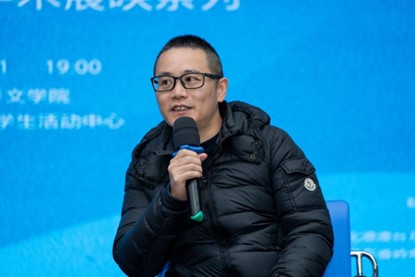
Professor Hou Xingquan admitted that he was initially worried about the effect of these films: "These three films have neither flashy special effects nor particularly tense dramatic conflicts. Will young people like to watch such films? But the fact is that everyone watched the three films quietly today and still doesn't want to leave." He also revealed the unique value of the three works: "These three films are localized expressions of Lingnan culture. And in the localized expression, an important foundation is dialect. All three films use dialect, and their success inspires us to continue thinking about the relationship between dialect and literature, dialect and aesthetics, and inspires us to express culture in a more diverse way."
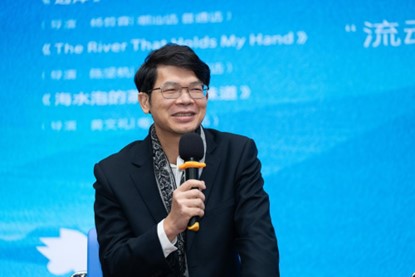
Professor Liu Yonglian said that he felt a pain unique to overseas Chinese in all three works. "Unwillingness to relocate is a characteristic of us Chinese. Hometown is our 'roots.' The pain of overseas Chinese comes from the ambiguity of their identities and homesickness, which is hard to be understood by others. As sociologists, we should pay more attention to this kind of pain and think more about how to make people far away from home feel that their 'roots' are here."

山海短片亮相暨大,归侨老校友赞不绝口
2023“向山海走去”青年导演创作扶持计划(简称“山海计划”),12月21日在暨南大学举办“山海展映季×流动岭南”学术展映系列活动。这是由山海计划青年导演们创作的山海短片首次在国内高校亮相,作品赢得了暨大师生的共鸣与点赞。
“山海展映季×流动岭南”学术展映系列活动由羊城晚报报业集团主办,暨南大学华文学院、暨南大学文学院、暨南大学中华文化港澳台及海外传承传播协同创新中心、广东省岭南数字人文实验教学示范中心联合主办。
山海短片亮相侨校,切中师生心弦
暨南大学是中国第一所由政府创办的华侨学府。“山海计划”这次选择了三部“寻根”题材作品进行展映,切中了不少暨大师生的心弦。
在《远洋》中,汕头青年导演杨哲霖试图解答一个问题:“根”到底是什么?他坦承:“我们年轻人对于‘根’的概念或许已经没有老一辈人那么执着,似乎哪里都是自己的‘根’。但是老一辈人会觉得,自己的父母在哪里,‘根’就在哪里。”“根”到底指某一个地方还是某一个特定的人?对答案的探寻成了杨哲霖创作《远洋》的初衷。
为了拍摄《The River That Holds My Hand》,潮州青年导演陈坚杭带着剧组前往越南,寻找华侨将他乡变故乡的足迹。他透露:“我身边几乎每个潮汕人都会有一个华侨亲戚,我希望用镜头记录他们的人生点滴。这不仅仅是一个人的故事,更是时代的记忆。”
在《海水泡的茶是什么味道》中,清远青年导演黄文礼讲述了一个发生在华侨农场的故事。片中主人公是一名归侨,他遇到了一系列的人生伤痛——先是失去了自己的家园,而在回国的途中又失去了爱人。这天,黄文礼说:“我想表达的是,时间并不是万能的。有些伤痛并不会随着时间而消逝,而我们要学会的就是如何与伤痛共存。”
当晚,暨大学生们在观影后纷纷表达了自己对影片的理解与喜爱。值得一提的是,两名暨大老校友也特地前来观影。两人都是归侨,因此对华侨题材电影尤其感兴趣,看完三部山海短片更是赞不绝口。其中一名老校友透露:“我是多年的《羊城晚报》读者,在报纸上看到‘山海展映’的消息的时候,我立刻跟我儿子说,无论如何我都要来看。”另一名老校友看完电影后更是激动难抑。她透露:“当年从印尼回国的时候我18岁,在华侨农场度过了20年的岁月,现在我已经81岁了。今晚的放映,唤起了我对青春岁月的回忆。”她表示,希望未来能看到更多华侨题材的影片。
暨大学者点赞:方言助力本土化表达
当晚,暨南大学华文学院院长侯兴泉教授,暨南大学文学院中外关系研究所所长刘永连教授,青年文艺评论家、暨南大学中文系郑焕钊副教授等专家学者,对三部山海短片进行了点评,并与“山海计划”的青年导演们进行了探讨和交流。
郑焕钊对三部山海短片的选题精妙表示了赞赏。他指出:“过去我们熟悉的华侨故事多强调海外生活的中国人的故事,但这几位年轻的导演基于他们自身成长的土地,选择讲述的华侨在中国的命运。”
侯兴泉教授坦承:刚开始他还对这次放映的效果有点担心:“这三部电影既没有炫酷的特技,也没有特别紧张的戏剧冲突。年轻人会喜欢看这样的影片吗?但事实是,今天大家安静地看完了三部电影,直到现在都还不愿意离开。”他还揭示了三部作品的独特价值:“这三部影片是对岭南本土化的表达。而在本土化的表达中,很重要的一个依据就是方言。三部电影都采用了方言,它们的成功启发我们继续思考方言与文学、方言与美学之间的关系,启发我们更多元地去表现文化。”
刘永连教授则说,他在三部作品里都感受到了一种独属于华侨的痛。“安土重迁,这是咱们中国人的一个特性。家乡就是我们的‘根’。”他说,“华侨的痛,来源于身份模糊、背井离乡。这种痛是别人很难体会的,作为社会学者,我们应该多关注这种痛,多思考如何让走得再远的人,都能够感受到他们的‘根’就在这儿。”
文|记者 李丽 实习生 张舒曼
图|记者 宋金峪
译|白心怡
-
Chow Tai Fook surpasses Hermès and Rolex in sales
2023-12-24 21:48:51 -
Spring Festival Travel Trends 2024: Cross-provincial trips emphasize 'festive atmosphere,' with 80% of travelers being families with children
2023-12-24 21:49:00 -
Spring Festival listed as UN floating holiday
2023-12-24 21:49:08 -
Luckin Coffee involved in war of glass and diamond: A shocking 100 bn Baht lawsuit unfolds in Thailand
2023-12-23 23:02:36






